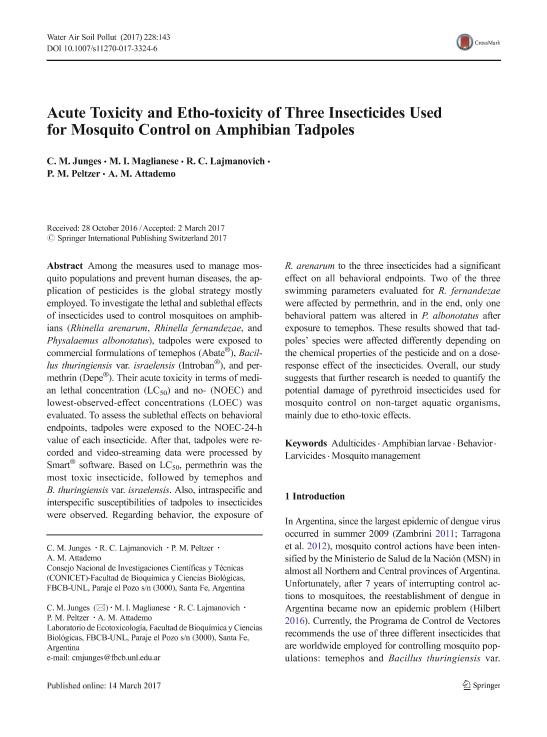Artículo
Acute Toxicity and Etho-toxicity of Three Insecticides Used for Mosquito Control on Amphibian Tadpoles
Junges, Celina Maria ; Maglianese, M. I.; Lajmanovich, Rafael Carlos
; Maglianese, M. I.; Lajmanovich, Rafael Carlos ; Peltzer, Paola
; Peltzer, Paola ; Attademo, Andres Maximiliano
; Attademo, Andres Maximiliano
 ; Maglianese, M. I.; Lajmanovich, Rafael Carlos
; Maglianese, M. I.; Lajmanovich, Rafael Carlos ; Peltzer, Paola
; Peltzer, Paola ; Attademo, Andres Maximiliano
; Attademo, Andres Maximiliano
Fecha de publicación:
01/2017
Editorial:
Springer
Revista:
Water, Air and Soil Pollution
ISSN:
0049-6979
Idioma:
Inglés
Tipo de recurso:
Artículo publicado
Clasificación temática:
Resumen
Among the measures used to manage mosquito populations and prevent human diseases, the application of pesticides is the global strategy mostly employed. To investigate the lethal and sublethal effects of insecticides used to control mosquitoes on amphibians (Rhinella arenarum, Rhinella fernandezae, and Physalaemus albonotatus), tadpoles were exposed to commercial formulations of temephos (Abate®), Bacillus thuringiensis var. israelensis (Introban®), and permethrin (Depe®). Their acute toxicity in terms of median lethal concentration (LC50) and no- (NOEC) and lowest-observed-effect concentrations (LOEC) was evaluated. To assess the sublethal effects on behavioral endpoints, tadpoles were exposed to the NOEC-24-h value of each insecticide. After that, tadpoles were recorded and video-streaming data were processed by Smart® software. Based on LC50, permethrin was the most toxic insecticide, followed by temephos and B. thuringiensis var. israelensis. Also, intraspecific and interspecific susceptibilities of tadpoles to insecticides were observed. Regarding behavior, the exposure of R. arenarum to the three insecticides had a significant effect on all behavioral endpoints. Two of the three swimming parameters evaluated for R. fernandezae were affected by permethrin, and in the end, only one behavioral pattern was altered in P. albonotatus after exposure to temephos. These results showed that tadpoles’ species were affected differently depending on the chemical properties of the pesticide and on a dose-response effect of the insecticides. Overall, our study suggests that further research is needed to quantify the potential damage of pyrethroid insecticides used for mosquito control on non-target aquatic organisms, mainly due to etho-toxic effects.
Palabras clave:
Adulticides
,
Amphibian Larvae
,
Behavior
,
Larvicides
,
Mosquito Management
Archivos asociados
Licencia
Identificadores
Colecciones
Articulos(CCT - SANTA FE)
Articulos de CTRO.CIENTIFICO TECNOL.CONICET - SANTA FE
Articulos de CTRO.CIENTIFICO TECNOL.CONICET - SANTA FE
Citación
Junges, Celina Maria; Maglianese, M. I.; Lajmanovich, Rafael Carlos; Peltzer, Paola; Attademo, Andres Maximiliano; Acute Toxicity and Etho-toxicity of Three Insecticides Used for Mosquito Control on Amphibian Tadpoles; Springer; Water, Air and Soil Pollution; 228; 4; 1-2017; 143-153
Compartir
Altmétricas



